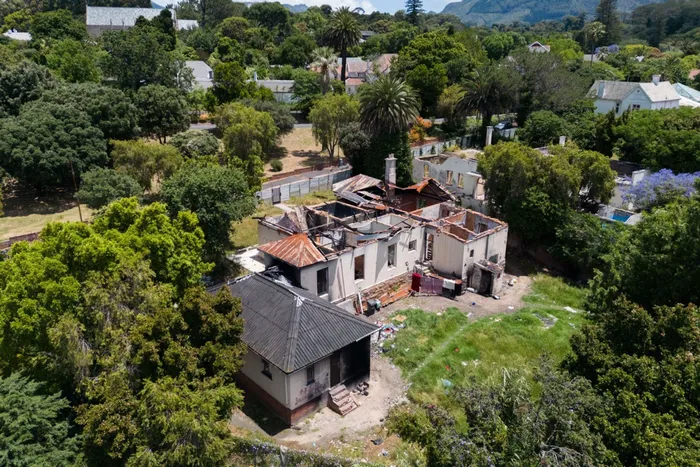Shooting follows nod for drug rehab

The parliamentary portfolio committee for public works and infrastructure has approved a report recommending that a drug rehab centre replace the ruins on a Department of Public Works and Infrastructure property in Wynberg. Picture: Surdo Prop
As the police probe the shooting of four men at a ruined Department of Public Works and Infrastructure (DPWI) property in Wynberg, a parliamentary committee has given the green light for a controversial plan to set up a drug rehab there.
The portfolio committee on public works and infrastructure last month adopted its report recommending that the ruins at Waterloo Green be renovated to be used as a drug rehab centre - the plan was proposed by the DPWI but has been opposed by the ward councillor and residents who feel a drug rehab is unsuitable for the area and the site could be better used to serve the community’s needs.
The report will now be sent to the National Assembly so the Minister of Public Works and Infrastructure can be held to the committee’s recommendations, says committee chair Nolitha Ntobongwana.
The report emanated from the portfolio committee’s meeting, last November, with Wynberg councillor Emile Langenhoven, residents and the DPWI’s Cape Town regional office during which it considered a petition for the demolition of two derelict properties on Waterloo Green.
Residents told the committee that the properties were in a poor state with squatting, drug use, prostitution and crime.
In the latest incident there, on Friday evening February 23 - just days after the committee adopted its report - four men were shot and wounded.
Provincial police spokesman Sergeant Wesley Twigg said the four had been shot by unknown perpetrator as they sat in one of the properties on Waterloo Green.
“One victim sustained a gunshot wound to his head, while the other victims sustained gunshot wounds to their bodies. They were transported to a medical facility for medical treatment.”
The shooter fled and is still at large, and the motive for the attack is unknown, according to Sergeant Twigg.
However, the portfolio committee’s report says crime and social ills dogging the property are broader than the immediate community and will not be solved by demolishing the derelict houses.
Prior to adopting the report, the committee said it was wrong of Mr Langenhoven to claim the committee’s recommendation had been the result of a “closed caucus” (“Waterloo Green drug rehab plan draws flak,” Bulletin, December 14)
“Saying that we have caucused it is so wrong and unfair to the members that apply their minds, read the documents and then discuss according to the information that is presented to us. We will not always agree on what is presented to us because the committee doesn't look at one side. We look at what the department and the community are presenting to us and come up with recommendations that we think will be favourable for that community,” said Ms Ntobongwana.
Shuaib Denyssen, a content advisor to the portfolio committee, echoed those sentiments, saying: “The committee’s decision towards action was not done outside the public eye. This was, in fact, done in the various meetings that the committee had, and the recommendations were sent in the minutes of the committee as well as the report. It is untrue that this was done clandestinely in some closed room.”
He added that the committee was deeply concerned with what it felt was the lethargic way in which the DPWI had dealt with the Waterloo Green properties and the fact that it had failed to send any written information setting out the steps it had taken to address the matter.
Another committee member, Mathapelo Siwisa, complained that the lack of information submitted by the department at the committee’s meetings had become a trend.
Meanwhile, Mr Langenhoven said the committee’s adoption of the report, in spite of not having received any written reports from DPWI’s Cape Town regional office, was indicative of the state of the DPWI in general.
“There seems to be no oversight of the regional offices and therefore no accountability. The regional office should be fully aware of this matter as community members regularly e-mail them about these properties. As I have mentioned before, the DPWI’s asset register is non-functional and they are not fully aware of which fixed assets they own.
“The derelict buildings are beyond repair and yet the standing committee believes it is repairable. It is clear that these houses have never been visited for a visual inspection other than by the two DA shadow ministers. I still question where the budget will come from in the current national fiscal crisis and whether we will see a brick laid within our lifetime.”
DPWI and its regional office did not respond to questions by deadline.